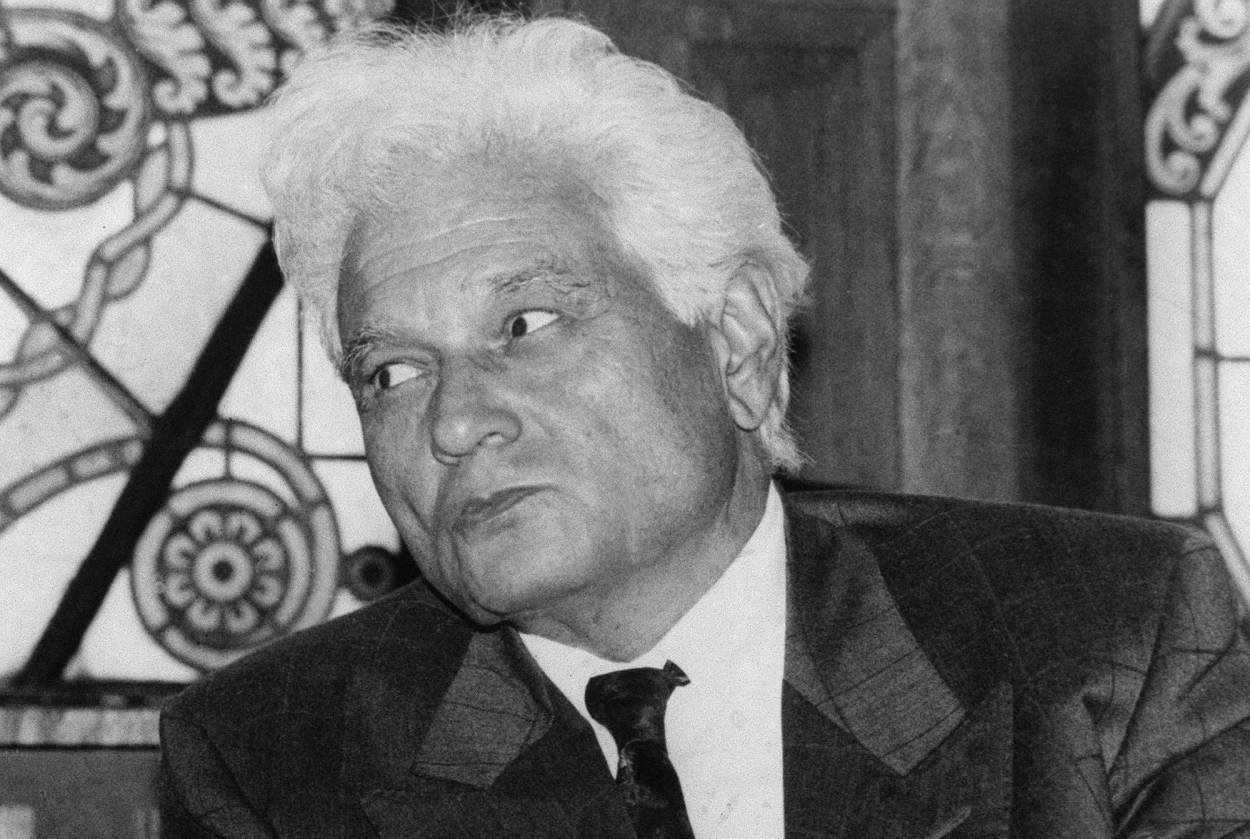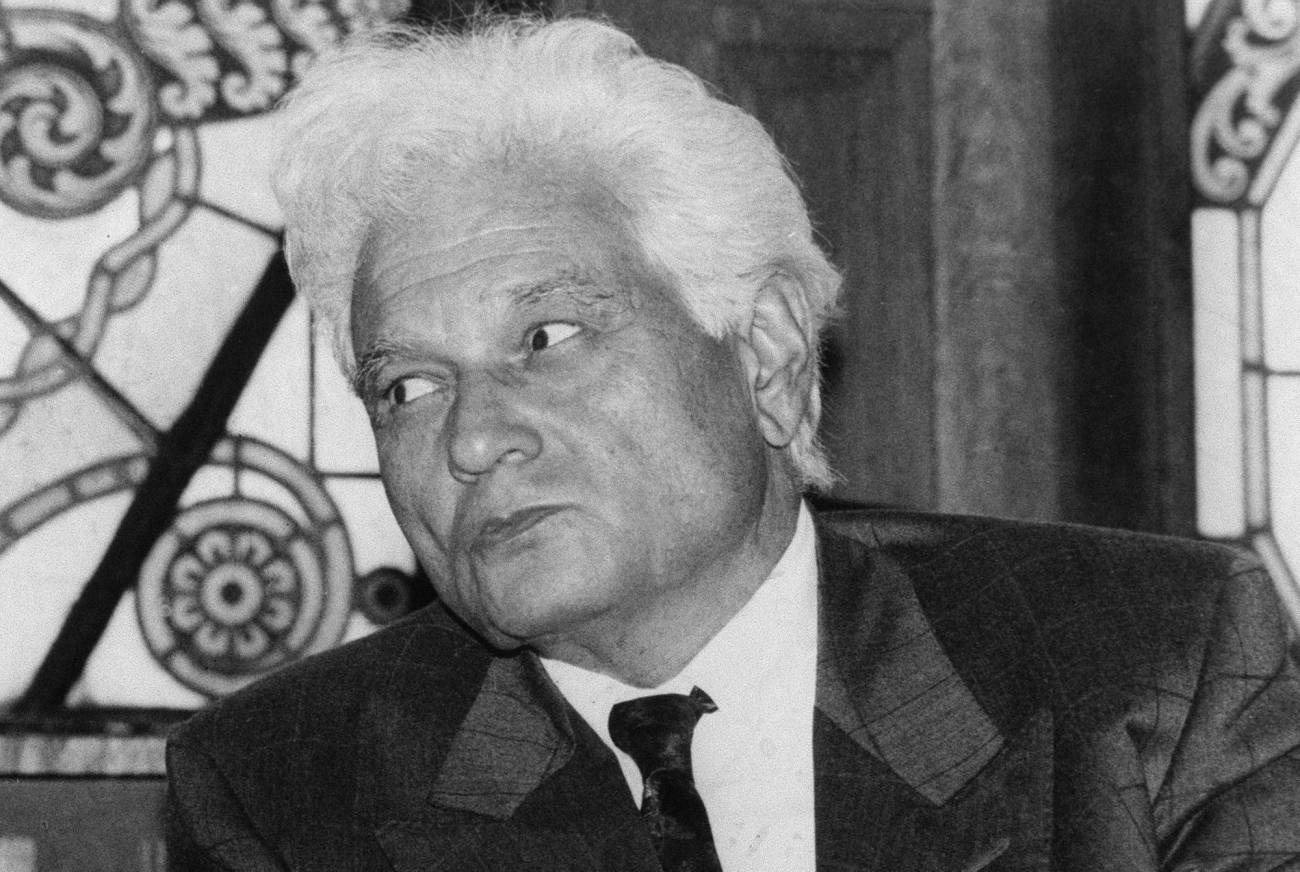Jacques Derrida’s Life as an Algerian Jew Revealed in Newly Translated Bio
The philosopher’s influential legacy is reshaped by the part of his life story that is often overlooked




“Writing a biography means living through an intimate and sometimes intimidating adventure,” writes Benoît Peeters in his newly translated biography of Jacques Derrida, who would have turned 83 today. But what is the difference between the biography of a living man and a dead man? In the Introduction to Derrida, published in France in 2010 and now beautifully translated into English by Andrew Brown, French artist, critic, and author Peeters writes, “Whatever happens, Jacques Derrida will not be part of his own life, like a sort of posthumous friend. A strange one-way friendship that he would not have failed to question.” The author continues in the book’s introduction: “I am convinced of one thing: there are biographies only of the dead. So every biography is lacking its supreme reader: the one who is no longer there. If there is an ethics of biographers, it can perhaps be located here: would they dare to stand, book in hand, in front of their subject?”
Peeters is pleased that his book is now appearing in English. “My biography of Derrida, the first to be based on research work first-hand, was very well received when it was published in France,” Peeters told me in a recent interview. “And Derrida as a thinker is reflected in the world; it was logical that my book be translated. The United States played a decisive role in the reception of deconstruction. It is therefore not surprising that the English translation was the first to appear,” he said. Soon, he added, there will be translations available in German and Spanish, as well as Chinese, Japanese, and Korean.
But there is also Jacques Derrida’s own reckoning on the art of biography to consider: “As you know, the traditional philosophy excludes biography, it considers biography as something external to philosophy. You’ll remember Heidegger’s reference to Aristotle: ‘What was Aristotle’s life?’ Well, the answer lay in a single sentence: ‘He was born, he thought, he died.’ And all the rest is pure anecdote.” While a French audience wouldn’t be surprised by such sardonic nihilism, it may be shocking for readers who are used to the ethic of Ralph Waldo Emerson, whose theory of history from a century earlier held that there is no history, only biography.
Derrida’s attitude toward biography may have also been shaped by the experiences of his own family and his resulting loss of verifiable connection to his origins. Most of the papers concerning Derrida’s family life and his early life growing up as a Jew in Algiers have disappeared. In a book review for the Guardian, literary theorist Terry Eagleton wrote:
At the age of 12, Derrida was excluded from his lycee when the Algerian government, anxious to outdo the Vichy regime in its anti-semitic zeal, decided to lower the quota of Jewish pupils. … Paradoxically, the effect of this brutal rejection on a “little black and very Arab Jew” as he described himself, was not only to make him feel an outsider, but to breed in him a lifelong aversion to communities. He was taken in by a Jewish school, and hated the idea of being defined by his Jewish identity. Identity and homogeneity were what he would later seek to deconstruct. Yet the experience also gave him a deep suspicion of solidarity.
In an interview, Peeters said, “In 1942, anti-Semitic measures taken by the Vichy regime had him excluded from school for a year. Like other Jews of Algeria, he was stripped of French nationality. These experiences marked him forever. But this time, he also kept away from the Jewish school founded by teachers excluded from formal education. These themes run throughout his life and his work.”
In 1962, Derrida’s parents left their home and his birthplace of El Biar in the “hill suburbs of Algiers.” But Peeters manages to capture content that may have seemed elusive to researchers and searchers for autobiographical sentiment. “I was part of an extraordinary transformation of French Judaism in Algeria: My great-grandparents were still very close to the Arabs in language and customs,” Derrida once recalled during a later-in-life interview quoted by Peeters.
Peeters, a one-time teacher of Bernard Henri-Lévy, was attracted to the project in part by the idea of exploring the literary biographical materials that the philosopher himself refused to trust. “I first wanted to capitalize on the huge archive left by Jacques Derrida, and I was the first to explore it,” Peters said. “I found notes, manuscripts, diaries, especially the thousands of letters of great literary quality. But it would have been absurd to rely only on written materials, while most of the relatives are still living.” He then proceeded to offer a glimpse at his craft: “Essential meetings were often long and sometimes repeated, with numerous witnesses, all ages. I had the chance to talk with the brother, sister, and cousin closest to Derrida, with his wife Margaret, his sons Peter and John, as well as many friends.” Reviewing in the Guardian, Elisabeth Roudinesco wrote of Peeters, “He is the first to have gained access to the writer’s records at France’s Institute of Contemporary Publishing Archives and the Langson Library at the University of California, Irvine. He also interviewed around 100 essential figures.”
The book explores everything from its subject early to later intellectual pursuits, beginning with his childhood initiation in Algeria into the world of cheap French novels and translations of Nietzsche. From this point, the young Derrida falls in love with Sartre, of whom he writes, “I recognize my debt, the filiation, the huge influence, the huge presence of Sartre in my formative years.” He writes, “I have never striven to evade it,” however he found Being and Nothingness to be “philosophically weak,” outshined as it were, by his early readings of Hegel, Husserl, and Heidegger. He would travel to Harvard University, leaving Paris in 1956, to study Husserl’s microfilms and acquired special audit status.
In this period, Derrida ambiguously asked his lifelong lover Marguerite and her family for their blessings in a decidedly quirky if not unorthodox application to matrimony. At Harvard he purchased an Olivetti 32 typewriter and, for the first time in his life, learned to use the mechanical instrument. His main reason for coming to America, however, according to Peeters, was to avoid military service. Derrida returned to Algeria in 1957, after marrying Marguerite and honeymooning in Paris, to join the military and please his bride’s family, with whom he had held rickety correspondence in the formative stages of arranging the marriage. Derrida asked to teach the children of soldiers in lieu of military service during the Algerian War for Independence from the French from 1957 to 1959. Most of the research for this section of the biography is based on formerly recorded memoirs, which Peeters has sifted through with care.
In 1960, Derrida was appointed an official lecturer at the Sorbonne in Paris. Peeters writes: “As there was no syllabus in general philosophy, Derrida was at liberty to choose his subjects. He gave entire lecture courses on Heidegger’s Kant and the Problem of Metaphysics and ‘What Is Metaphysics.’ ” Peeters stresses that Derrida’s ethics for public politicizing and propagandizing were built and developed in consequence of the geopolitical upshot of the Algerian War. Peeters makes a citation of a book that greatly influenced Derrida’s opinion of Algerian geopolitics. The book was The French of Algeria published by Julliard, written by one of Derrida’s fellow pupils at Louis-le-Grand, his wartime station: “Isn’t it difficult to lay the blame for all of France’s policies in Algeria over the past 130 years on something like the French Algerians (in spite of their massive and unremitting guilt, which should neither be overlooked nor diluted on the pretext of sharing it round)?” The citation continues, “If, as you say, the French Algerians have indeed been the ‘makers’ of their own history and misfortune, this is true only if, at the same, one points out that all governments and the whole army (in other words the whole French people in whose name they act) have always been the masters.”
Derrida supported the writings of Albert Camus—a French Algerian elder contemporary and a thoughtful absurdist—while gracefully disagreeing with his philosophy. Peeters explains, “Over and above the wounds on the family and personal level, the Algerian War also constituted one of the stimuli for all Derrida’s political thinking.” Perhaps it is his political thinking that this biographer is able to crystallize and explain more efficiently than others and perhaps via Derrida’s own memoirs and interviews: “In France,” writes Peeters, “for years, he would avoid speaking in public about a subject that remained too controversial. But in an interview he gave in Japan in 1987, he acknowledged that, while he had approved of the Algerians’ struggle for independence, he had long hoped for ‘a solution that would allow the French Algerians to continue to live in that country,’ ‘an original political solution that was not the one that actually came about.’ ” In his final TV broadcast in 2004, Derrida refers to the Israel and Palestine conflict, seeing it as “a different problematic than that of two sovereign states” and using his purview of the Algerian Republic and war as a random geopolitical corset to assess the situation. Benoît Peeters’ inclusion of these opinions makes his biography unique in shaping Jacques Derrida’s legacy in a way that a new generation would benefit from knowing.
***
Like this article? Sign up for our Daily Digest to get Tablet Magazine’s new content in your inbox each morning.
Scott Krane is a New York-based writer.
Scott Krane is a New York-based writer.